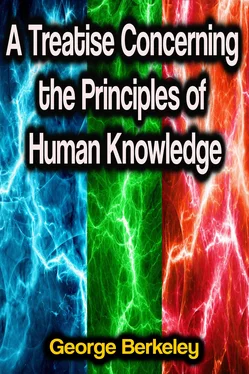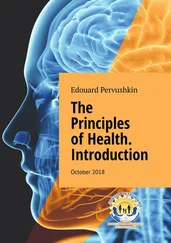7 It is agreed on all hands that the qualities or modes of things do never really exist each of them apart by itself, and separated from all others, but are mixed, as it were, and blended together, several in the same object. But, we are told, the mind being able to consider each quality singly, or abstracted from those other qualities with which it is united, does by that means frame to itself abstract ideas. For example, there is perceived by sight an object extended, coloured, and moved: this mixed or compound idea the mind resolving into its simple, constituent parts, and viewing each by itself, exclusive of the rest, does frame the abstract ideas of extension, colour, and motion. Not that it is possible for colour or motion to exist without extension; but only that the mind can frame to itself by abstraction the idea of colour exclusive of extension, and of motion exclusive of both colour and extension.
8 Again, the mind having observed that in the particular extensions perceived by sense there is something common and alike in all, and some other things peculiar, as this or that figure or magnitude, which distinguish them one from another; it considers apart or singles out by itself that which is common, making thereof a most abstract idea of extension, which is neither line, surface, nor solid, nor has any figure or magnitude, but is an idea entirely prescinded from all these. So likewise the mind, by leaving out of the particular colours perceived by sense that which distinguishes them one from another, and retaining that only which is common to all, makes an idea of colour in abstract which is neither red, nor blue, nor white, nor any other determinate colour. And, in like manner, by considering motion abstractedly not only from the body moved, but likewise from the figure it describes, and all particular directions and velocities, the abstract idea of motion is framed; which equally corresponds to all particular motions whatsoever that may be perceived by sense.
9 And as the mind frames to itself abstract ideas of qualities or modes, so does it, by the same precision or mental separation, attain abstract ideas of the more compounded beings which include several coexistent qualities. For example, the mind having observed that Peter, James, and John resemble each other in certain common agreements of shape and other qualities, leaves out of the complex or compounded idea it has of Peter, James, and any other particular man, that which is peculiar to each, retaining only what is common to all, and so makes an abstract idea wherein all the particulars equally partake- abstracting entirely from and cutting off all those circumstances and differences which might determine it to any particular existence. And after this manner it is said we come by the abstract idea of man, or, if you please, humanity, or human nature; wherein it is true there is included colour, because there is no man but has some colour, but then it can be neither white, nor black, nor any particular colour, because there is no one particular colour wherein all men partake. So likewise there is included stature, but then it is neither tall stature, nor low stature, nor yet middle stature, but something abstracted from all these. And so of the rest. Moreover, their being a great variety of other creatures that partake in some parts, but not all, of the complex idea of man, the mind, leaving out those parts which are peculiar to men, and retaining those only which are common to all the living creatures, frames the idea of animal, which abstracts not only from all particular men, but also all birds, beasts, fishes, and insects. The constituent parts of the abstract idea of animal are body, life, sense, and spontaneous motion. By body is meant body without any particular shape or figure, there being no one shape or figure common to all animals, without covering, either of hair, or feathers, or scales, &c., nor yet naked: hair, feathers, scales, and nakedness being the distinguishing properties of particular animals, and for that reason left out of the abstract idea. Upon the same account the spontaneous motion must be neither walking, nor flying, nor creeping; it is nevertheless a motion, but what that motion is it is not easy to conceive.
10 Whether others have this wonderful faculty of abstracting their ideas, they best can tell: for myself, I find indeed I have a faculty of imagining, or representing to myself, the ideas of those particular things I have perceived, and of variously compounding and dividing them. I can imagine a man with two heads, or the upper parts of a man joined to the body of a horse. I can consider the hand, the eye, the nose, each by itself abstracted or separated from the rest of the body. But then whatever hand or eye I imagine, it must have some particular shape and colour. Likewise the idea of man that I frame to myself must be either of a white, or a black, or a tawny, a straight, or a crooked, a tall, or a low, or a middle-sized man. I cannot by any effort of thought conceive the abstract idea above described. And it is equally impossible for me to form the abstract idea of motion distinct from the body moving, and which is neither swift nor slow, curvilinear nor rectilinear; and the like may be said of all other abstract general ideas whatsoever. To be plain, I own myself able to abstract in one sense, as when I consider some particular parts or qualities separated from others, with which, though they are united in some object, yet it is possible they may really exist without them. But I deny that I can abstract from one another, or conceive separately, those qualities which it is impossible should exist so separated; or that I can frame a general notion, by abstracting from particulars in the manner aforesaid- which last are the two proper acceptations of abstraction. And there are grounds to think most men will acknowledge themselves to be in my case. The generality of men which are simple and illiterate never pretend to abstract notions. It is said they are difficult and not to be attained without pains and study; we may therefore reasonably conclude that, if such there be, they are confined only to the learned.
11 I proceed to examine what can be alleged in defence of the doctrine of abstraction, and try if I can discover what it is that inclines the men of speculation to embrace an opinion so remote from common sense as that seems to be. There has been a late deservedly esteemed philosopher who, no doubt, has given it very much countenance, by seeming to think the having abstract general ideas is what puts the widest difference in point of understanding betwixt man and beast. "The having of general ideas," saith he, "is that which puts a perfect distinction betwixt man and brutes, and is an excellency which the faculties of brutes do by no means attain unto. For, it is evident we observe no foot-steps in them of making use of general signs for universal ideas; from which we have reason to imagine that they have not the faculty of abstracting, or making general ideas, since they have no use of words or any other general signs." And a little after: "Therefore, I think, we may suppose that it is in this that the species of brutes are discriminated from men, and it is that proper difference wherein they are wholly separated, and which at last widens to so wide a distance. For, if they have any ideas at all, and are not bare machines (as some would have them), we cannot deny them to have some reason. It seems as evident to me that they do, some of them, in certain instances reason as that they have sense; but it is only in particular ideas, just as they receive them from their senses. They are the best of them tied up within those narrow bounds, and have not (as I think) the faculty to enlarge them by any kind of abstraction."- Essay on Human Understanding, II. xi. 10 and 11. I readily agree with this learned author, that the faculties of brutes can by no means attain to abstraction. But then if this be made the distinguishing property of that sort of animals, I fear a great many of those that pass for men must be reckoned into their number. The reason that is here assigned why we have no grounds to think brutes have abstract general ideas is, that we observe in them no use of words or any other general signs; which is built on this supposition- that the making use of words implies the having general ideas. From which it follows that men who use language are able to abstract or generalize their ideas. That this is the sense and arguing of the author will further appear by his answering the question he in another place puts: "Since all things that exist are only particulars, how come we by general terms?" His answer is: "Words become general by being made the signs of general ideas."- Essay on Human Understanding, IV. iii. 6. But it seems that a word becomes general by being made the sign, not of an abstract general idea, but of several particular ideas, any one of which it indifferently suggests to the mind. For example, when it is said "the change of motion is proportional to the impressed force," or that "whatever has extension is divisible," these propositions are to be understood of motion and extension in general; and nevertheless it will not follow that they suggest to my thoughts an idea of motion without a body moved, or any determinate direction and velocity, or that I must conceive an abstract general idea of extension, which is neither line, surface, nor solid, neither great nor small, black, white, nor red, nor of any other determinate colour. It is only implied that whatever particular motion I consider, whether it be swift or slow, perpendicular, horizontal, or oblique, or in whatever object, the axiom concerning it holds equally true. As does the other of every particular extension, it matters not whether line, surface, or solid, whether of this or that magnitude or figure.
Читать дальше












